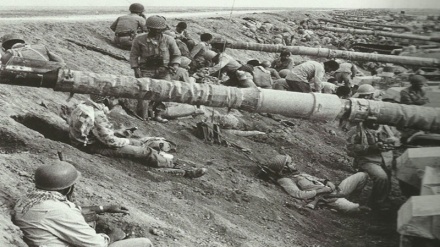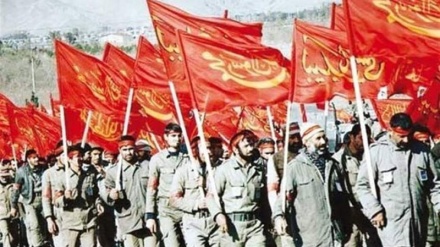Glimpses of Epic of the 8-Year Holy Defense (84)
The 1975 Algiers Accord was the agreement that Saddam had signed with Iran’s Shahs before the victory of the Islamic Revolution. The accord settled the existing disputes between Iran and Iraq on the borders and the Arvand River. On September 17, 1980, Saddam tore up the Algiers Accord before the TV cameras and claimed Iraqi full control over the river.
Then on September 22, the Iraqi army started an all-out aggression against the Islamic Republic of Iran along the common borders with Iran. Saddam sought three goals in invading Iran. First, he wanted to annul the Algiers Accord. Secondly, he wanted to separate Khuzestan province from the Iranian territory. And thirdly, he intended to overthrow the Islamic Republic system.
The Iraqi dictator failed to achieve any of his ambitions of invading Iran. Therefore, as a result of 8 years of stiff resistance of the Iranian nation, he was forced to accept the 1975 Algiers Accord again and give in to Iran’s demands.
Saddam in his 6th letter to then Iranian President, Akbar Hashemi Rafsanjani, while admitting the acceptance of the accord, wrote, “With this decision, anything has become clear and, thus, everything that you wanted and stressed will materialize and there remains nothing but exchanging of documents.”
The last British ambassador to Tehran, Antony Parsons, wrote, after Saddam re-accepting of the Algiers Accord, “Saddam failed in invasion of Iran because of the Iranian resistance and when he noticed that he could not dominate over Iran, he reneged on his conditions.”
After accepting the Algiers Accord by Saddam and withdrawal of the Iraqi forces from all of the occupied regions, it was the turn for implementation of other articles of the UN Security Council Resolution 598. The most important pragraph was the exchanging of POWs, declaration of the aggressor and determination of the damages inflicted upon Iran. Former UN Secretary General Javier Perez de Cuellar, in order to implement paragraphs 6 and 7 of Resolution 598, wrote a letter to Iran and Iraq on August 14, 1991 and asked the two countries to declare their reasons for the initiator of the war. This request faced with Iraq’s ridicule and the country presented a very hollow response on August 26 with a series of documents. But, the Islamic Republic of Iran sent substantive documents in book-form on September 15. The Iranian documents were based on article 51 of the UN Charter pertaining to legitimate defense.
The UN chief, after consultation with a group of his experts and studying Iranian and Iraqi documents, gave them to an impartial group. Finally, De Cuellar announced his opinion on December 9, 1991, stressing in an official report that Iraq was the initiator of war. Part of article 6 of the report reads, “The outstanding event, that I have mentioned in article 5 under the title of violation of international rights and regulations, was the September 22, 1980 attack on Iran which, according to the UN Charter, internationally recognized principles and laws, or international morals, is not justifiable and leads to the responsibility of hostility.”
The UN Secretary General also said in paragraph7 of the report, “Even if before the start of hostility, there had been some aggressions from Iran to the Iraqi soil, such aggressions cannot justify the Iraqi aggression to Iran which would result in the continued occupation of Iran’s soil; an aggression that breaches prohibition of usage of force which is one of the authoritative principles of the international rights.”
The UN Secretary General’s report on announcement of the aggressor was a great victory for Iran. Although there were very obvious documents and evidence on the issue, the international community had kept tacit for several years vis-à-vis the aggression. It was in fact the Iranian resistance that forced the UN to bow to the legal demand of Iran. After this UN move, Saddam wrote a letter to Iran’s president. As a matter of fact, his intention of sending letters to Iran was to settle his differences with Iran temporarily; and cause Iran not to insist on implementation of other paragraphs of the resolution.
Some of the Western and Arabic radios and news agencies said that Saddam’s second time accepting of the Algiers Accord indicated that he was the aggressor and initiator of war. German radio Köln said, “Saddam in 1980 started the war against Iran with ignoring the 1975 Algiers Accord.” Kuwaiti agency, quoting Austrian diplomatic sources, said, “Saddam, who submitted before Iran and accepted Iran’s conditions for peace, has officially confessed the initiation of was against Iran.” The Saudi radio, also, quoting military experts, said, “Accepting Iran’s conditions by Saddam is the reason for the regime’s invasion of the Iranian soil.”
During the 8-year imposed war, Saddam’s supporters in the West and the East didn’t let even a single resolution be approved at the UN Security Council against the Iraqi dictator. Their ultimate request was the declaration of ceasefire without even mentioning the necessity of pullout of the invading country from the occupied regions. The Western and Eastern powers and their regional cohorts and henchmen were seeking to overthrow the nascent Islamic Republic system. They generously equipped Iraq with the state-of-the-art weaponry and provided it with the latest intelligence and logistical aids. Moreover, they assisted Iraq financially. Militarily, Saddam’s army was the 4th army in the world with 1.8 million forces. It possessed 600 aircrafts and 6,000 tanks. This army had gathered valuable experiences during the 8-year war. So, the Iraqi war machine had turned into a threat to the regional countries and the vested interests of the big powers. That’s why they thought of annihilating this machine. It is naïve to say that Saddam’s aggression against Kuwait was only due to his ambition. There is ample documents and evidence to indicate that he invaded the Southern neighbour upon the Washington’s green light. This move gave the US the pretext for military expedition together with its allies and accomplices to the region. The UN admission of Iraq’s aggression against Iran was indeed to announce the expiry date of Saddam.
RM/ME


